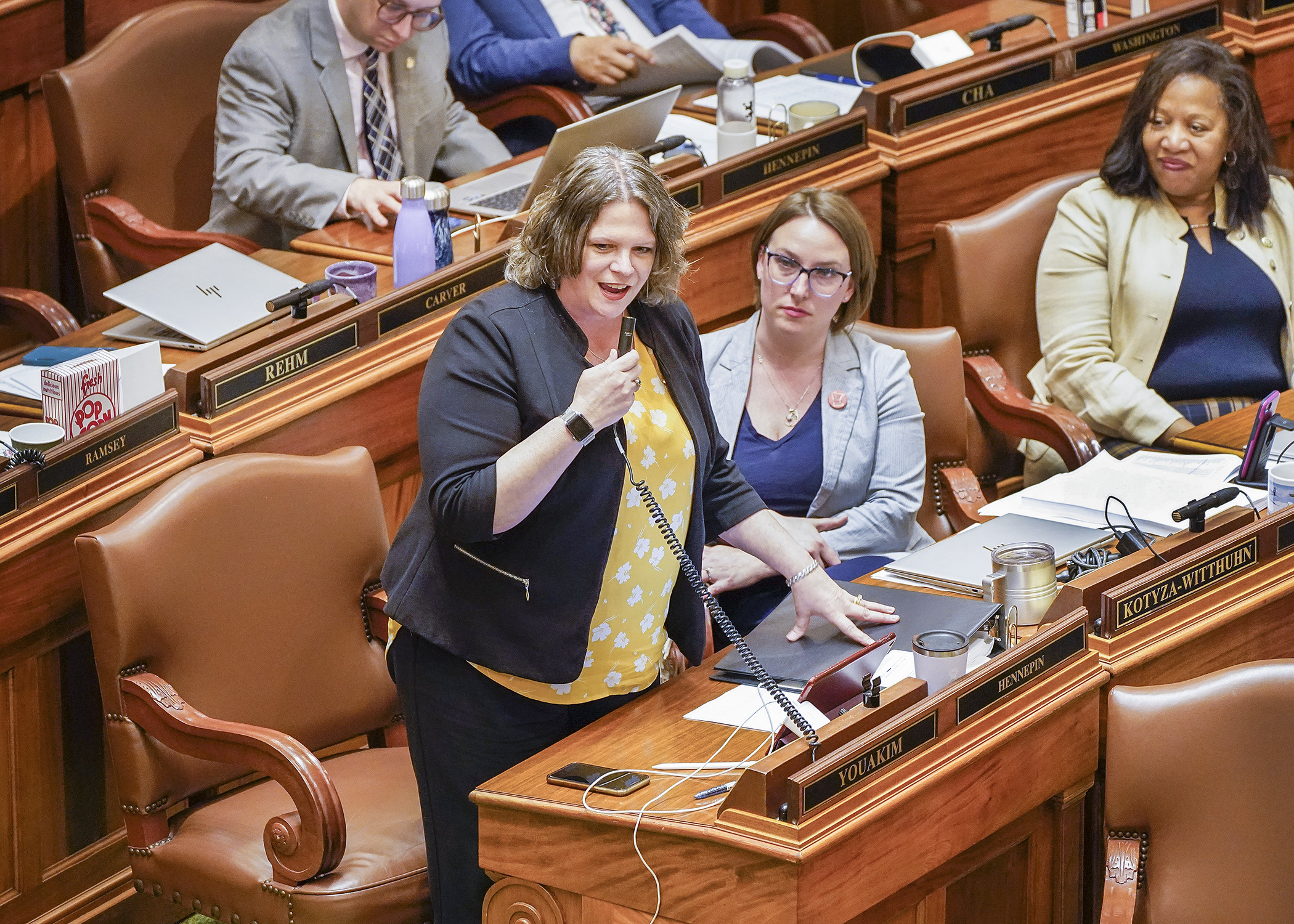House passes K-12 education bill that features $2.2 billion funding boost, contentious policy changes

The education finance and policy agreement returned from conference committee has House DFLers ecstatic.
“With this proposal, we make historic investments in our schools,” said Rep. Cheryl Youakim (DFL-Hopkins). “We’ve had over 20 years of underinvestment in our schools. And while we cannot change that overnight, or even in one biennium, this bill is an awesome start.”
Youakim and Sen. Mary Kunesh (DFL-New Brighton) sponsor HF2497 that calls for $23.2 billion in K-12 education spending next biennium, an increase of $2.26 billion, or 10.2% over base.
[MORE: View the spreadsheet]
The House repassed the bill, as amended by a conference committee, 70-62 Tuesday. It now heads to the Senate, and likely, the governor.
House conferees won the fight on many of their top funding priorities. Most remarkably, the basic funding formula — the main mechanism through which the state funds K-12 education — would be indexed to inflation starting in fiscal year 2026. The bill’s language details certain parameters that would limit the annual increase to between 2% and 3%, with Youakim touting this budgetary feat.
Prior to this automatic increase kicking in, the funding formula would be raised by 4% in fiscal year 2024 and 2% in fiscal year 2025 at a cost of $705 million.
Sitting at a mere 6.43% in recent years, special education cross-subsidy aid is due to skyrocket. Districts could expect to have 44% of this annual shortfall covered through fiscal year 2026, then ramp up to 50% starting with fiscal year 2027. The cost in the upcoming biennium would total $663 million.
Plans to extend unemployment insurance to hourly school workers are in the conference committee report as well, with the bill committing $135 million to reimburse districts for this new expense.
A huge bite is due be taken out of the English Learner cross-subsidy, as the bill would earmark $87 million next biennium in this funding area; $81.7 million would go toward pre-Kindergarten education, preserving 4,000 pre-K seats in danger of disappearing and establishing an additional 5,200 seats in fiscal year 2025; and a statewide overhaul of literacy education is set to net $75 million.
Other notable appropriations would include:
- $74.4 million for student support personnel aid and workforce development, to attend to students’ mental, behavioral, and physical health needs;
- $45.2 million for school library aid;
- $37 million for Grow Your Own teacher grants, designed to increase the size and diversity of the teaching workforce;
- $30 million to establish a special education teacher pipeline;
- $24.3 million for building safety and cybersecurity grants;
- $15 million for full-service community school grants;
- $9.9 million to cover 35% of the transportation sparsity aid cross-subsidy, up from the current rate of 18.2%; and
- $2 million to kickstart construction of gender-neutral bathrooms.
The bill also calls for a plethora of policy changes, especially in regard to measures long sought by American Indian educational advocates, such as:
- prohibiting schools from using Indian symbols or names as mascots, unless all 11 of the state’s tribal nations sign off on an exemption request;
- replacing Columbus Day with Indigenous Peoples’ Day on the school calendar; and
- adding Indigenous education to the state’s academic standards during the next 10-year review.
Additional changes are also primed for the classroom.
Civics and personal finance courses would be required for high school graduation, effective with students beginning ninth grade in the 2024-25 school year. Holocaust and genocide studies would be embedded in the social studies curriculum beginning with the 2026-27 school year, while a directive for schools to offer ethnic studies courses would be phased in throughout the decade.
Moreover, substantial modifications are planned for active shooter drills, a mandate is included for schools to carry menstrual products and opiate antagonists, and all school employees are set to receive full pay and benefits on e-learning days.
Finally, a contentious provision forbidding higher education institutions participating in the postsecondary enrollment option program from requiring faith statements of applicants is in the amended bill, garnering condemnation on the House Floor as a discriminatory attack on religious freedom from several Republican members.
Republicans were sharply critical of many other aspects of the conference committee report, too.
“The bill that you have in front of you has at least 65 mandates that will be put on our schools,” said Rep. Patricia Mueller (R-Austin). “This is a transformational bill. The problem is it doesn’t transform the way we need it to be.”
She took issue with the expanded power of the Department of Education over locally elected school boards, which she believes ought to be in the driver’s seat for setting educational standards and making funding decisions instead.
Other members criticized the expansion of unemployment insurance as fiscally irresponsible and the READ Act as insufficient in addressing the state’s intensifying literacy crisis.
Related Articles
Search Session Daily
Advanced Search OptionsPriority Dailies
Ways and Means Committee OKs House budget resolution
By Mike Cook Total net General Fund expenditures in the 2026-27 biennium will not exceed a hair less than $66.62 billion.
That is the budget resolution approved Tuesday by the House Ways...
Total net General Fund expenditures in the 2026-27 biennium will not exceed a hair less than $66.62 billion.
That is the budget resolution approved Tuesday by the House Ways...
Minnesota's budget outlook worsens in both near, long term
By Rob Hubbard It looks as if those calling for less state spending could get their wish, judging from Thursday’s release of the February 2025 Budget and Economic Forecast.
A state su...
It looks as if those calling for less state spending could get their wish, judging from Thursday’s release of the February 2025 Budget and Economic Forecast.
A state su...